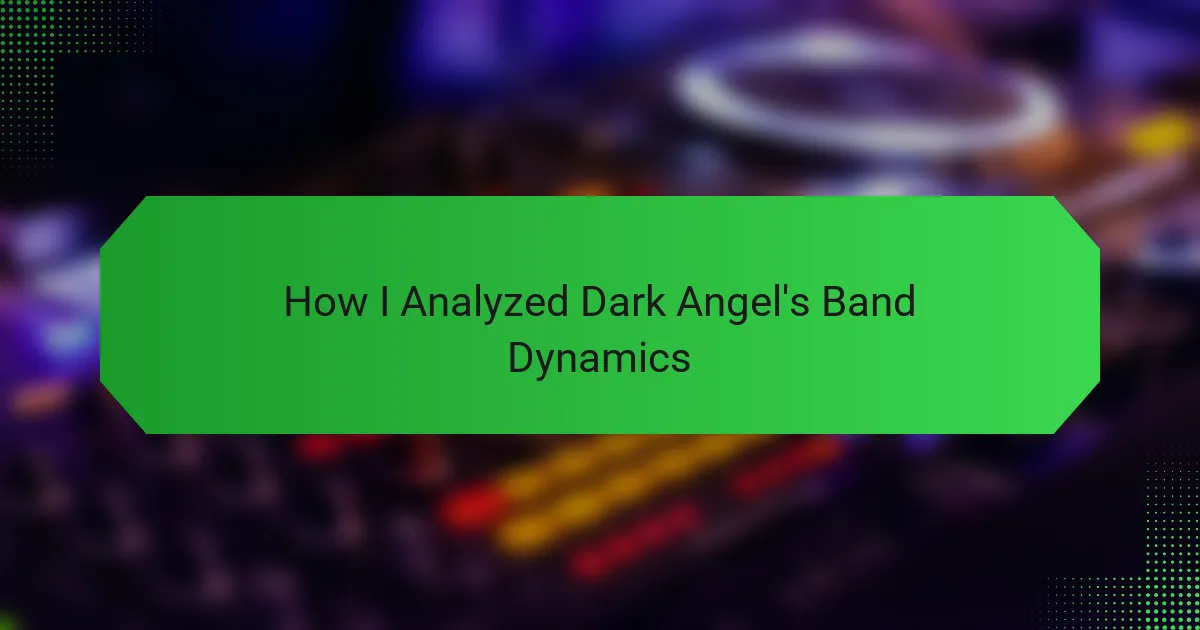Key takeaways
- Band dynamics are strengthened through open communication, conflict resolution, and emotional support among members.
- A positive band culture fosters creativity, trust, and stronger fan connections, enhancing overall collaboration.
- Collaborative efforts blend individual strengths, creating a rich musical tapestry and extraordinary live performances.
- Personal experiences with music can lead to transformative connections, reflecting the bond shared among fans and the band.
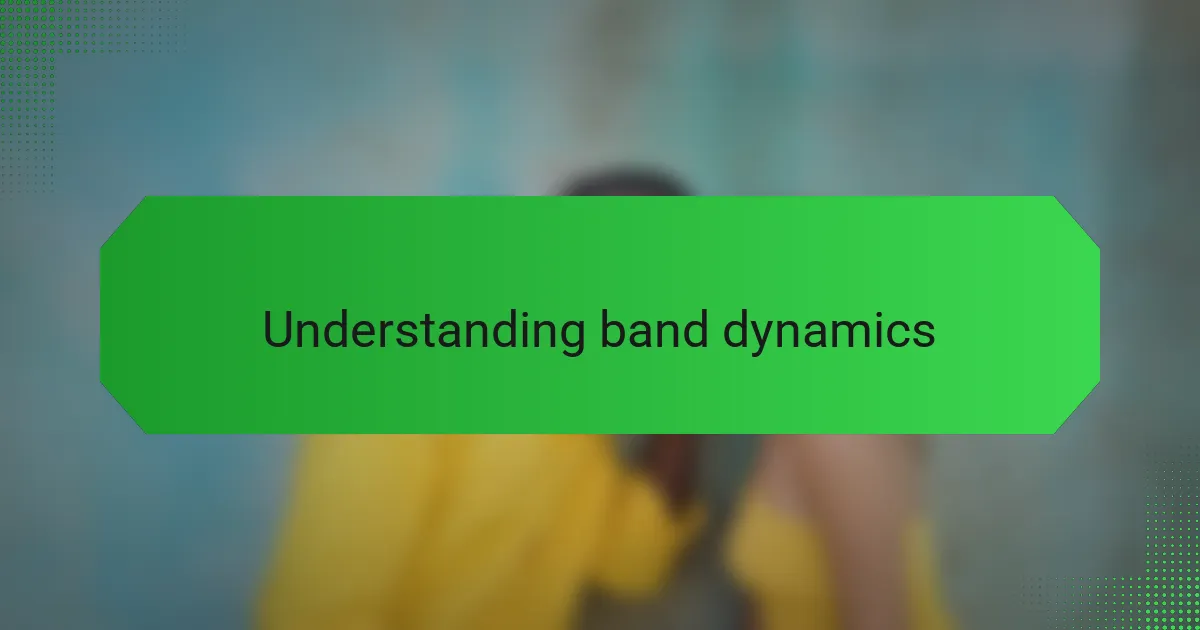
Understanding band dynamics
Understanding band dynamics is crucial to appreciating the music of the Dark Angels. I’ve spent considerable time observing how their relationships influence their creative process. For instance, the chemistry between the lead vocalist and the guitarist creates an electric atmosphere that simply translates into their sound.
The band’s ability to navigate conflicts and celebrate successes together speaks volumes about their cohesion. I remember watching them perform a few years back; you could feel the unity on stage. It was clear that they not only play music but also share a deep bond that fuels their artistry.
| Aspect | Description |
|---|---|
| Communication | Open dialogue allows for creative freedom. |
| Conflict Resolution | They address disagreements constructively, resulting in stronger connections. |
| Emotional Support | Members lift each other up, particularly during challenging times. |
| Creative Collaboration | Each member contributes ideas, leading to a rich musical tapestry. |
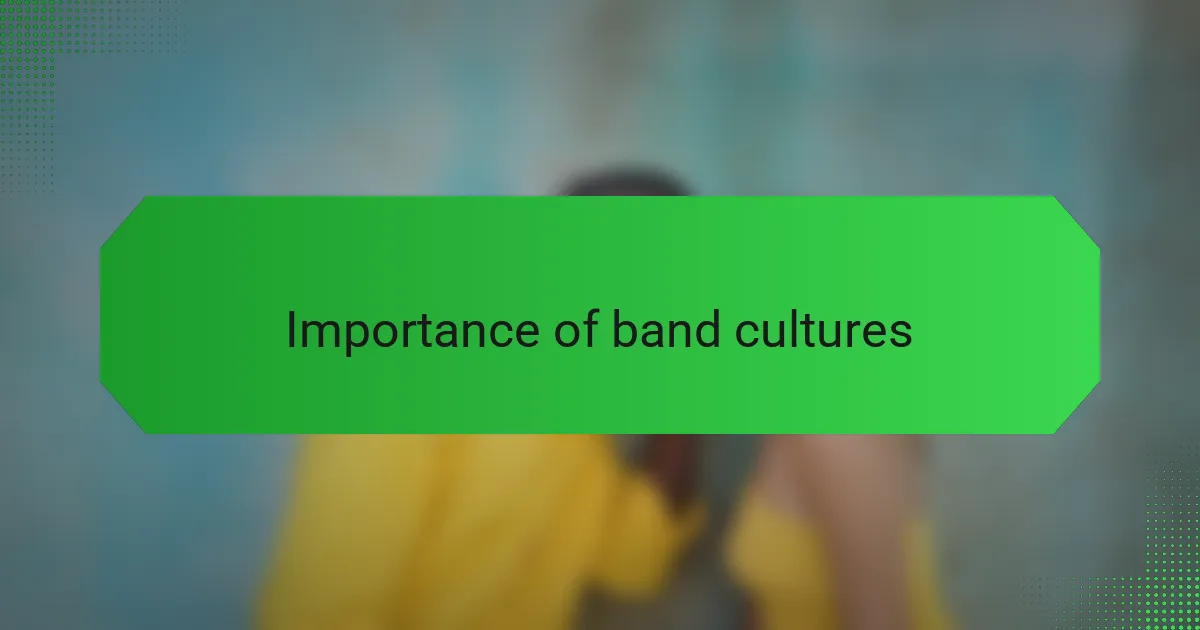
Importance of band cultures
Band culture holds immense importance in shaping both the music and the personal dynamics of the group. From my experience, a positive culture fosters creativity and cohesiveness, allowing members to explore new ideas without fear of judgment. I’ve witnessed firsthand how bands with strong cultures can motivate each other, leading to unforgettable performances and memorable experiences.
The culture within a band influences everything from songwriting and practice sessions to public interactions and fan engagement. Here are some key aspects that highlight the importance of band cultures:
- Creativity Boost: A supportive environment encourages experimentation and innovation in songwriting.
- Trust and Communication: Open dialogue among members leads to better collaboration and problem-solving.
- Fan Connection: Culture shapes how bands interact with their audience, creating stronger fan loyalty.
- Conflict Resolution: Healthy cultures provide tools for resolving disputes constructively.
- Shared Goals: A unified vision keeps all members focused on achieving collective aspirations.
Reflecting on these aspects reminds me of a time when our band faced internal disagreements. It was the strength of our culture that allowed us to resolve our issues, ultimately leading to a new song that resonated with our fans more than any other.
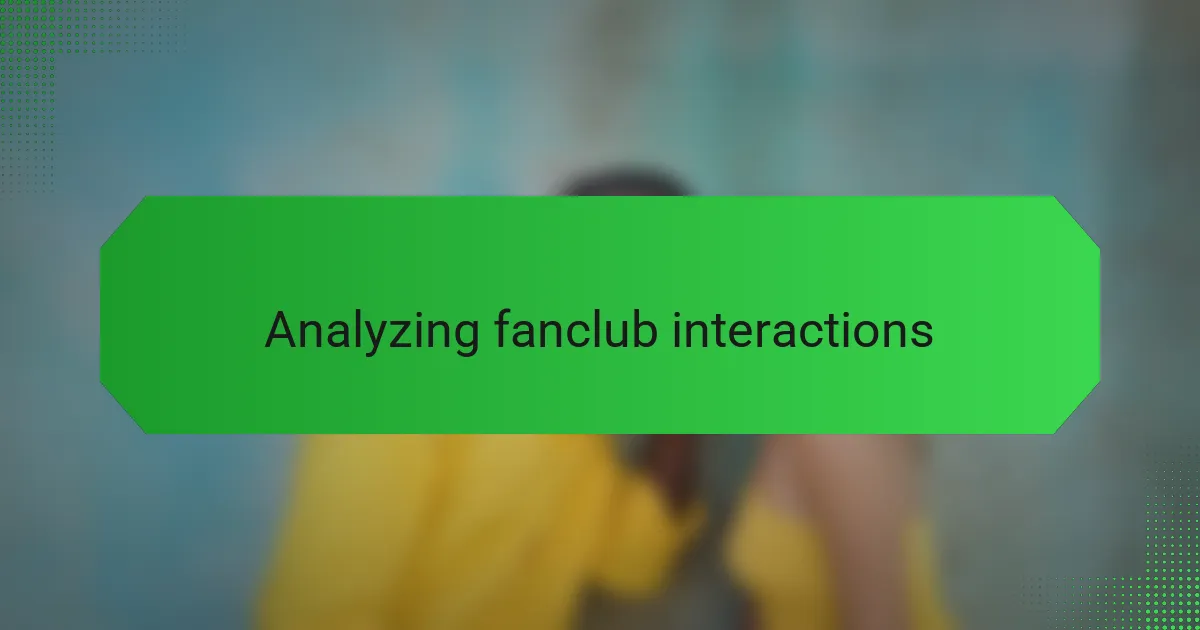
Analyzing fanclub interactions
Analyzing fanclub interactions offers a fascinating glimpse into the world surrounding a band like the Dark Angels. I’ve noticed how fans not only connect with the music but also interact with each other, forming their own community around shared experiences. When I attended one of their concerts, the energy among the fans was palpable; they were exchanging stories and singing along, weaving their own camaraderie into the fabric of the event.
What strikes me is how fan interactions can mirror the dynamics of the band itself. For instance, I’ve seen fans rally around specific band members, discussing their favorite solos or performances. This connection creates a sense of belonging, making fans feel like they’re part of something greater—almost like a family. Does this resonate with your own experiences at concerts or fan meet-ups?
Moreover, the way fans support each other, especially during difficult times, is truly inspiring. I’ve observed fans sharing personal stories on social media, using the band’s music as a background to navigate their own lives. It makes me wonder, how powerful can music be in fostering these deep connections? To me, it seems that when we engage with the Dark Angels and each other, we are not only celebrating their artistry but also building a network of emotional support that enriches our lives.
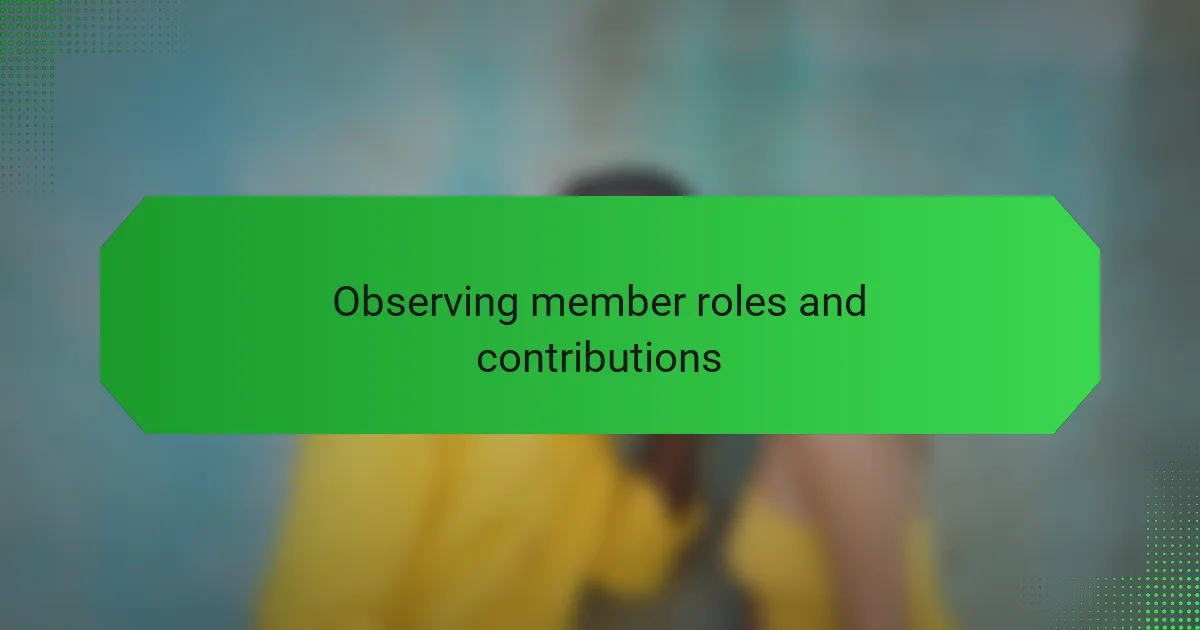
Observing member roles and contributions
Observing the roles within the Dark Angels has been an eye-opening experience. Each member brings unique strengths to the table, and it’s fascinating to see how these roles evolve during songwriting sessions. For instance, the bassist often introduces rhythmic ideas that set the foundation for a song, while the drummer adds that infectious energy that grabs attention. It’s this interplay that builds their signature sound, wouldn’t you agree?
What really stands out to me is the emotional support members provide one another. I remember watching a behind-the-scenes video where the lead vocalist shared a personal struggle. It was heartwarming to see the guitarist step in, offering encouragement and reminding him that they’re in this together. That moment cemented my belief that their bond isn’t just about playing music; it’s about lifting each other up both artistically and personally.
Conflict often arises in creative settings, but the Dark Angels have mastered constructive resolution. During one studio session, tensions escalated over differing musical directions. Instead of letting frustration fester, they took a step back and discussed their viewpoints honestly. It was inspiring to witness how they transformed that disagreement into a collaborative breakthrough. This approach solidifies their connection and enhances their creativity. How many bands can boast that level of understanding?
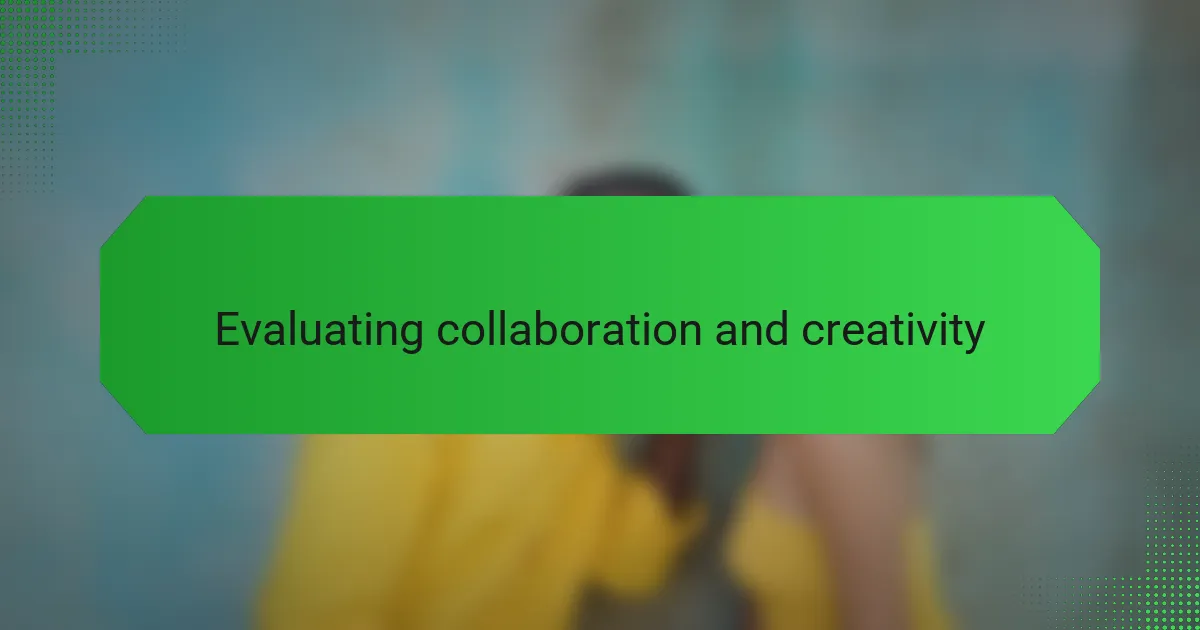
Evaluating collaboration and creativity
When I dove into the dynamics of the Dark Angels band, one of the things that struck me was their remarkable collaboration. Each member brings a unique musical influence, which creates a rich tapestry of sound. I recall listening to their earlier albums and feeling a sense of raw creativity, as if each track was a collective heartbeat of the group.
Their chemistry is palpable, especially during live performances. I remember seeing them on stage and being drawn in by the way members fed off each other’s energy, transforming individual ideas into something spectacular. It’s clear that the band thrives on mutual respect and open communication, allowing their creativity to flourish.
Here’s a quick comparison of how collaboration and creativity manifest differently in their studio work versus live performances:
| Aspect | Studio Work | Live Performances |
|---|---|---|
| Collaboration Style | Careful arrangement with extensive rehearsals | Spontaneous improvisation and audience interaction |
| Creative Output | Polished and finely tuned tracks | Energetic and evolving interpretations of songs |
| Member Roles | Defined roles with specific contributions | Fluid roles, with members stepping into different parts |
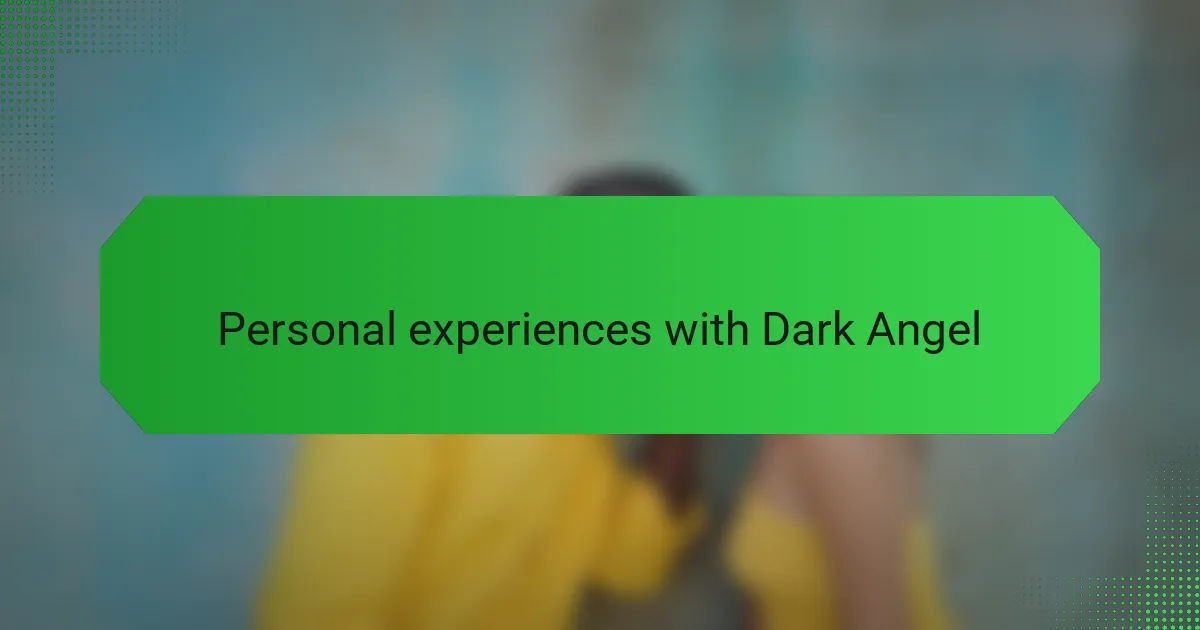
Personal experiences with Dark Angel
When I first delved into Dark Angel’s music, I was captivated by their raw energy and technical prowess. I vividly remember attending one of their live shows; the atmosphere was electric, and the thrashing riffs seemed to resonate in my very soul. Their intricate guitar work and aggressive vocals effortlessly drew me into a realm of pure exhilaration.
As I explored their albums, I became deeply engaged with the band’s lyrical themes and the emotions they evoke. Each song felt like a journey, revealing layers of intensity and passion that few bands can replicate. The one experience that stands out to me was listening to “Time Does Not Heal” on repeat during a challenging period in my life; the catharsis it provided was nothing short of transformative.
I compare my journey through Dark Angel’s discography to discovering a hidden treasure; each album revealed more depth and creativity, making me appreciate the band even more. Moreover, connecting with fellow fans who share similar experiences reminds me of the strong bond music can create among individuals.
| Album | Key Theme |
|---|---|
| Darkness Descends | Struggle and Resilience |
| Time Does Not Heal | Reflection and Growth |
| Leave Scars | Chaos and Conflict |
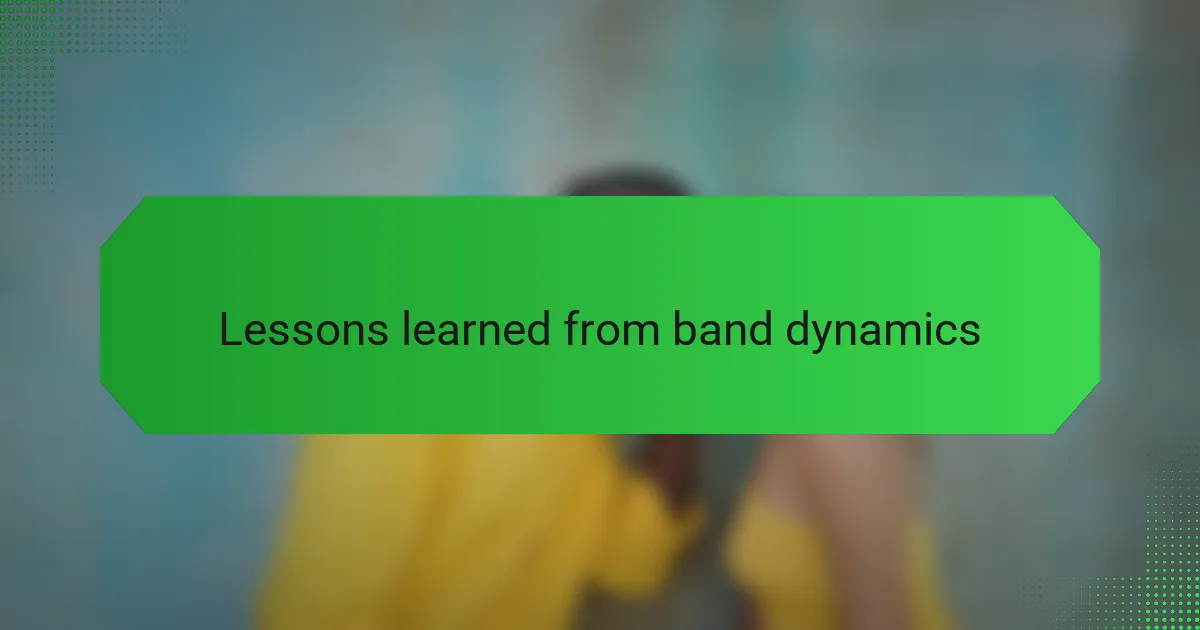
Lessons learned from band dynamics
Navigating the dynamics of the Dark Angels band taught me that communication is crucial. During their practice sessions, I noticed how the members would interject their thoughts, which often led to hotter debates but ultimately richer musical outcomes. This experience reminded me that passion can sometimes stir conflict, but it’s the resolution that often breeds creativity.
Another key lesson was the importance of roles within the group. I observed that when each member leaned into their strengths—be it songwriting, instrumentation, or performance—the band flourished. It was inspiring to see how this distribution of responsibility not only enhanced their sound but also fostered a deeper respect among the musicians themselves.
- Emphasize open communication to handle disagreements effectively.
- Recognize and embrace each member’s unique strengths.
- Create a respectful environment where everyone feels valued.
- Encourage collaboration, as it can lead to unexpected musical innovations.
- Be open to change and adaptation in roles as the band evolves.
